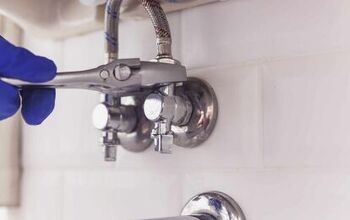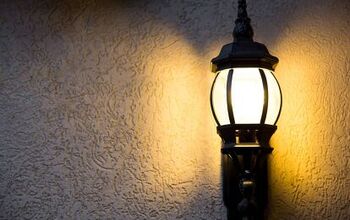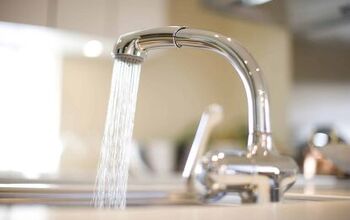Burst Of Black Water From Faucet? (Possible Causes & Fixes)

The water coming from our faucets may be purified, but that doesn’t mean it is pure. City water often has fluoride in it, and the pipes in your home can put other minerals in your water, too. Sometimes this can cause water discoloration, especially if you turn the water off for a period of time.
A burst of black water from the faucet could be mineral deposits like iron or copper flowing through the plumbing system or rusty pipes. An old filtration system, hard water, or black resin beads from a water softener can also cause black water. A new filtration system or using a water softener that removes excess minerals from your water can help.
There are a bunch of points of contact for water in your house before it comes to the faucet. If it starts in a well, there is a well pump and piping to your home. Once the water is inside, you likely have a water softener, a water heater, and a lot more piping. Any of these items can cause problems, and we will go through the most common culprits below.
Do You Need to Hire a Plumber?
Get free, zero-commitment quotes from pro contractors near you.

Corroded Pipes Can Lead to Black Water
Usually, when your water comes out black, it is from some mineral that has gotten in your water. Below is a chart showing the different possibilities. We will go through them in more detail after that.
| Mineral | Discoloration | Toxicity |
| Magnesium | Oxidation | Non-toxic |
| Copper | Oxidation | Safe to drink in small quantities |
| Iron | Can be iron flakes from steel pipes, or can be brown/orange | Not toxic in normal drinking water quantities |
Magnesium is usually present in our water in some quantity. However, when it mixes with oxygen, it turns black. This is not a severe problem, as it is safe to drink.
If you live in a warm and humid environment, it is possible for your copper pipes to leach copper into your water. Oxidized water does turn black and can be part of your problem. However, as you will see below, copper pipes are very durable and not supposed to leach. This would signify that hard water from a water softener issue is damaging the pipes.
Alternatively, it is possible to have minerals leach from your well or the surrounding ground if the well is compromised. For example, iron in your water is likely from your well and would signify a damaged water softener. You could have iron rust from old steel pipes, but iron in water is more likely from a well.
Finally, in nearly all of these cases of black water, the water is still safe to drink. You would need to drink an extreme amount of water to reach copper or iron toxicity levels. The only mineral that makes water unsafe is lead from old lead pipes, as you likely heard about during the Flint, Michigan water crisis.
Hire a Plumber to Complete a Water Test
Any of these issues can be confirmed with a simple water test. You can have a professional sample and test your water to properly diagnose the specific mineral turning your water black. A plumber can then examine your pipes to see where they are corroding.
If your pipes are not the issue and the well is, a plumber can also investigate and diagnose an issue here. If neither is the issue, as noted above, it could be the water softener or water heater. We will talk about those next.
Problems with your Water Softener Can Cause Black Water
Black Resin Beads
Water softeners work by passing water through a bed of resin beads. These resin beads have “soft ions” on them that exchange with the “hard ions” on the water. This exchange thereby turns your hard water soft.
Some of these resin beads can naturally be black. Over time, they can break down and end up in your water. Therefore, your water will look black when the beads are wearing down.
However, there is no need to worry! These resin beads are not toxic. Additionally, the water softener is easy to clean, and the resin beads easy to replace if need be. Do you want to know how to stop this from happening, check out the video below.
Hard Water in your Pipes
As noted above, corroded pipes are the most common reason water comes out black. However, it is possible that the pipes are not the entire problem. The problem could stem from your water softener.
Though it is possible to have black resin beads in your water, it is not the most common water softener cause of black water. More likely, the issue with your water softener is actually causing your water to turn black more indirectly.
In other words, a damaged water softener can be the initial issue that causes black water later on. This is because soft water is important not just for taste and comfort, but also for your plumbing system. Water pipes are not equipped to stand up to too hard water.
If you have corroded pipes, you should keep digging to find out what caused them to become damaged. If your water softener is not working properly, the hard water can be the cause of your damaged pipes. Corroding pipes are the most likely cause of black water, and your water softener could be the issue behind that.
Black Water Can Result from Water Heater Build-Up
It is possible for an issue with your water heater to cause discoloration of your water. One possibility is a build-up of sediment in the bottom of the water heater. This can happen as a result of sediment in your water at the well. Alternatively, it can be a mineral build-up, since the water naturally has minerals in it.
If your water heater is the problem, there may be other signs you notice to help diagnose this issue. First and foremost, if the water heater is the issue, you will notice it only with hot water. This should be obvious since cold water will not pass through the water heater. If the water comes out black from both hot and cold taps, you can cross the water heater off your list of potential issues.
Other signs of a damaged water heater are noise and smell. The water heater could be making sounds or causing sputtering at your faucets. Sputtering is a build-up of gas, which would indicate bacterial activity in the water heater. Any bacterial issue will also have a smell associated with it, so this would be a dead giveaway.
Hiring a Plumber
With any of the above issues, it is always best to hire a professional. A plumber can properly inspect all elements of your water system and provide a professional analysis of the problem. Typical hourly rates for plumbers are listed below.
| Professional Contractor | Hourly Rate |
| Plumber | $50 – $200 |
Some of the above problems can be a simple fix, while others may take longer. If some of your pipes are corroded, this could be a significant replacement job. Or, your system may need to be flushed thoroughly of all water in it.
For example, a water heater build-up issue requires it to be drained out, cleaned, and flushed. A job like this may take eight hours and cost around $500.
Do You Need to Hire a Plumber?
Get free, zero-commitment quotes from pro contractors near you.

Related Questions
Why are black specks coming out of my faucet?
If the water is clean, but there are tiny specks in it, this is a separate issue. Most likely, the rubber washer located in your faucet has started to disintegrate. You can unscrew the aerator and examine the rubber washer that sits between it and the spout.If this happens, or if the faucet leaks or makes noise, you can easily replace the washer yourself. These faucet washers only cost a few dollars at your local hardware store. Make sure to get the right size for your faucet!
Can black mold grow in faucets?
Yes, black mold can grow anywhere that there is regular moisture and something for it to consume. The mold is mostly an airborne particle that came into your home and attached it to this moisture source. If your faucet is leaky or your drain is clogged, these are common places for mold to build up.That being said, black mold is not likely the cause of black water coming from a faucet. Mold will look slimier and thicker than regular water, and it will not live in water, only on damp surfaces.You can use bleach to clean mold from a faucet. You can also prevent mold build-up by making sure sites dry thoroughly and have adequate ventilation.
Related Guides

Benjamin is a freelance writer and graphic designer. He is passionate about DIY projects and finding creative ways to upcycle things headed for the landfill. Based in Oakland, CA, Benjamin enjoys playing guitar and gardening.
More by Benjamin Panico



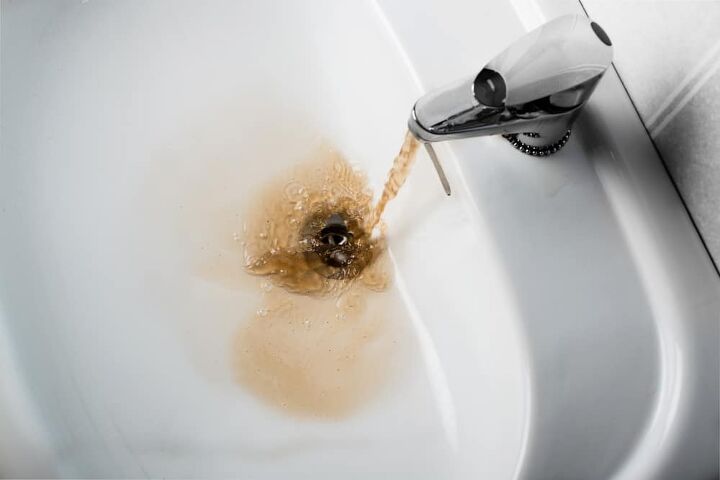






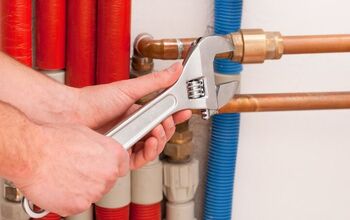








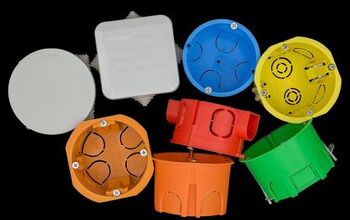
![How To Reset A Whirlpool Cabrio Washer [In 5 Easy Steps!]](https://cdn-fastly.upgradedhome.com/media/2023/07/31/9076531/how-to-reset-a-whirlpool-cabrio-washer-in-5-easy-steps.jpg?size=350x220)
